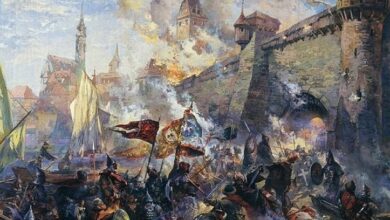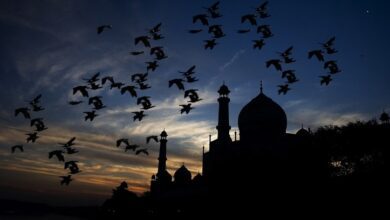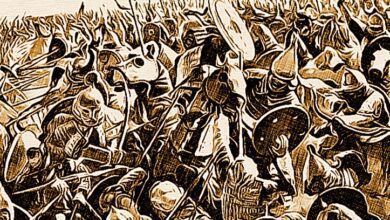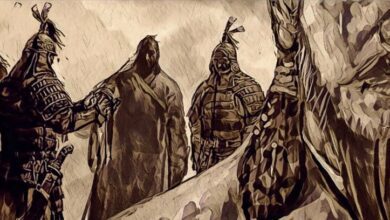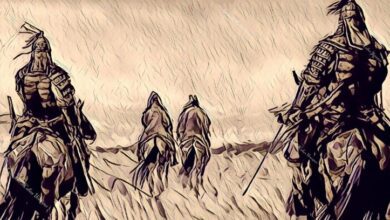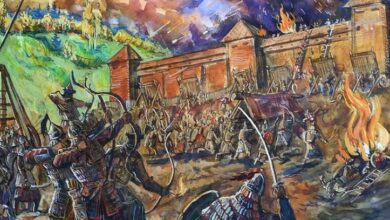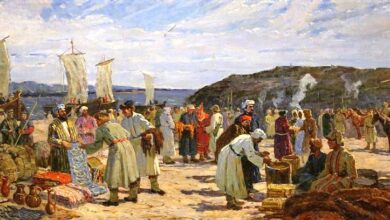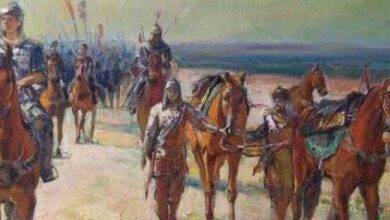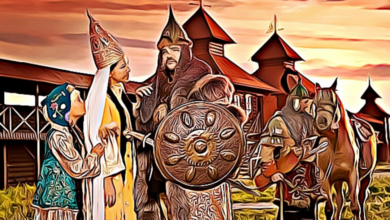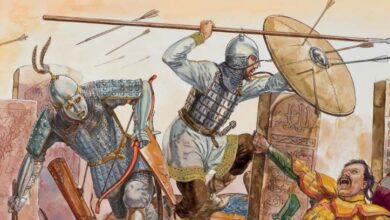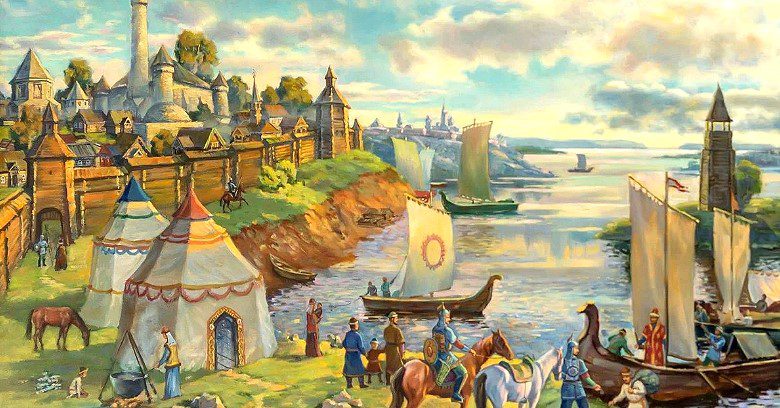
Bu-Yurgan kitabs. Chapter 1
AND I wrote this out from "Bu-Yurgan kitaba", which was also called "Kazan tarihi". It was written by our eminent Sheikh Mohammedyar and said the following:
“... In 1262, Berkay, burdened by the humiliating role of the governor of the great Tatar Khan in Kypchak Yorty, separated his region from Chin, the region of the great Khan. After that, all the Tatars left Kipchak, and their place in it was taken by the Kipchaks, who, due to the service of the Tatar dynasty of Jochi, began to be called "Tatars". After all, the word "Tatar" meant "a hired person going to his death for the sake of the khan." Since that time, the Cuman speech began to dominate in the Kypchak, and they began to write on the "Turan body", and the Kypchaks achieved their goal - through the Jochids they made the Russians dependent on themselves.
After the separation of the Jochids, Emir Khisam refused to recognize dependence on the Kypchak, as the Russians did, because the Bulgar, unlike Rus', “was in a favorable alliance with the Chin. The selected Tatar corps of Burilday stood between Idel and Dzhaik and did not allow the Kypchaks to make a direct attack on the Bulgar state. Then Berkay ordered those Russian beks who had previously submitted to Bulgar to attack our merchants and governors. The Russians plundered our merchants and governors in the cities of Balyn and Djir, and tore the chief governor Gazi-Baba to pieces in Djir itself.
Emir Khisam decided to endure this with clenched teeth, but the son of Yaldau Tukhchi-Ismail, who was eager for power, loudly accused him of cowardice and moved on Bolgar from Dzhuketau. But when Djiku, as Ismail was called by the Tatars, broke into the Bolgar, he learned that Khisam had already died. The timid beks immediately raised him to the throne.
Boyan-Mohammed immediately returned to Kazan, but only to die there.
200
201
He was succeeded by his son Laish. Naryk, the son of Bachman, remained in the city of Kamysh-Samara on Kinel as an Ulugbek of the province of Samar, as Bellak began to be called. And the province of Suvar was divided between the provinces of Bolgar and Samar. Burildai agreed with our people not to fortify Kamysh-Samar, because his Tatars feared the proximity of strong fortresses. And everyone called these Tatars "Bulgarian Tatars", and they themselves were proud of this name ...
In Echke Bulgar, the Chin owned a part of the Gyulistan quarter of the Bolgar, which was also called the Sainov uram or courtyard, and the area between the Khonturcha and Sok rivers with magnificent pastures. Here were the ruins of the Turchy fortress, which the Tatars called "Bolgar". By ceding these areas, Ghazi-Baradj prevented at one time the transfer of the State to the category of countries dependent on the Chin with the payment of tribute provided for in it and the trips of the rulers for appointments. The Bulgars remained an independent ally of the Chin, but for this our people had no right to interfere in the life of the Tatar regions and even had to pay a toll for passing through them or grazing cattle in their lands. Burildai, being Chin's ambassador in Bulgar, like Bagrim, owned these areas and minted coins for Kypchak in Sain's urn. When Ismail once asked him why he minted coins for the rebellious Kypchak, he replied: “What's the point if we stop doing this? Kipchak organizes his own mint. And so everyone sees that the Kypchak coins were minted in the Great Bolgar at the Chin mint - and imbued with respect for the great Khan of the Tatars.
And our Bulgarian masters minted coins, whose work Chin rewarded very highly, for the Tatars and Kypchaks did not know this business at all. The same craftsmen or their relatives minted Bulgarian coins in the Bulgarian quarter Men Bulyar, where there was a beautiful stone caravanserai "Men Bulyar"...
After Berkay seized the Russian beks that were dependent on Bulgar and brought his Bashkaks there, Galidj received permission from the khan to wage war with the State and invaded the province of Biysu. This war was very difficult for us, since both Bulymer and Balyn helped the Galidjians, and our forces were divided ...
In 1267, after the death of Berkay, Galimbek seized the emir's throne, but in 1277 he was thrown from it by Ismail, who immediately sent envoys to Sultan Bibarys. Sultan - a native of the Bulgar Badjanaks - was captured during the capture of Bagcha-Bolgar by the Kumans and was sold first to the Rumians, and then to the Mamil merchants ...
This embassy greatly alarmed the Tatars, but the Sultan did not have time to help his compatriots ...
At the height of this war, the commander of the Kypchak, Korym-Timur, managed to persuade Burilday to betray Chin and to go to the service of the Kypchak. In vain Kalmak, brother of Burildai, tried to counteract this madness: the bashkak ordered to be tied up and thrown into a zindan. And the name Kalmak came from the Tatar name of the river Kalga, where Subyatai defeated the Russians and Cumans. Kalmak's father was proud of his participation in this massacre and therefore gave his son the name of the river.
Learning about what had happened, the new khan of Kypchak - a hater of Islam, Mankay - did not hesitate: he quickly gathered 120 thousand of his Kypchak Tatars and 40 thousand Russians in the field and invaded Bulgar through the possessions of the traitor Burildai. The "Bulgarian Tatars", who were friends with ours and outraged by the massacre of their favorite - Kalmak, refused to fight against the State, but still the preponderance of forces was on the side of the enemies. Ismail, realizing that the Kipchaks would not dare to pass through the Chin regions, went to meet the enemy to the new fortress of Bulyar - Tatyak, only half built. 15,000 Cossacks, mostly Bashkort youths, managed to come here to him, and the citadel itself was defended by 700 Nur-Suvar infantrymen. The enemy surrounded the emir's army, but it fought valiantly for a whole week. Not a single Bulgar left the battlefield - all the fighters perished along with their emir. The son of Tukhchi-Ismail took refuge in Challah.
Furious from the loss of 50,000 Kipchak Tatars and 20,000 Russians, Korym-Timur rushed through Agidel with the intention of devastating Kashan and Kazan. The Kypchaks had already slaughtered a million Bulgars in Cheremshan and were counting on slaughtering the rest of the people beyond Agidel. But here, while trying to take Chally, Korym-Timur received an iron arrow in the eye, and his soul went straight to hell. Since that time, Challs were often called Korym-Challi in memory of this. The Kipchaks of this wicked man - numbering up to 20 thousand - were scattered throughout the Kashan province, but with 2 thousand Kashan Cossacks and 10 thousand armed subashes they ruthlessly cut the enemies distraught with horror. The Kypchaks near Dzhuketau and Yar Challov did not know what to do, when suddenly a messenger from Bolgar arrived to them with a notice about the elevation of Emir Galimbek to the Bulgarian throne and about the consent of the new ruler of the Bulgar state to pay tribute to the Kypchak. The Kypchaks immediately leave in a discordant crowd for their steppe, along with 5,000 cavalry Russian beks and boyars, leaving the Russian infantrymen to the mercy of fate. Those, led by a certain Khalib, intended to go to Rus' through Bolgar, but near the city of Nukrat, on the border of the Bulgarian and Cheremshan provinces, they were surrounded by a detachment of the son of Gazan Kul-Burat and the Yarchally people and ended their journey here ...
202
203
Much of the country was devastated. 40 cities and 600 villages were completely destroyed.
The number of those killed was five times higher than the number of those killed in 1236 in Bulyar, and in it the Tatars slaughtered 200 thousand people. The State suffered the same losses later only during the invasions of Idegeya ...
But the disasters didn't end there. Shortly after the Tatyak war, Bulak, the son of Galimbek, drove Laish out of Kazan. He went to Agidel and founded the city of Laish there. At the same time, Kazan was heavily defeated, and only the settlement of Akbikul remained from it, which is why it was sometimes called Akbikul. Bulak resettled most of the Kazanians in Echke-Kazan, which became the center of the possessions of the descendants of Gazi-Baradj - "Azanoviches" ("Azanlylar") in the Western Bulgar. The descendants of Yaldau - "Ashrafids" ("Ashrafilar") - entrenched the Eastern Bulgar with Cheremshan and Bashkort and with the center in Dzhuketau.
And Khan Mankai, shocked by the death of his father-in-law Korym-Timur, wanted to repeat the raid on the Bulgars and wipe our State from the face of the earth. Burilday, the only Tatar who participated in the Tatyak massacre, also incited him to this. Bashkak wanted to seize all the lands of Bulgar, but he met the opposition of Khan Nogai, who was dissatisfied with the rule of Mankai and coveted the possessions of Burildai himself. Since the campaign could not take place without a good third of the Kipchaks, who were subordinate to Nogai, it was first postponed, and then they forgot about it. Ten years after the Tatyak war, Burildai and Nogai were thrown against the Persian Tatars at the decisive moment of the battle between the Kypchak and Persia over Azerbaijan. In a terrible battle, Nogai suddenly left the battlefield, and the Persian Tatars settled accounts with the traitor Chin Burilday - they trampled him under the hooves of their horses. Nogai received the possessions of Burilday, for the "Bulgarian Tatars", who survived the battle of Azerbaijan, released their beloved Kalmak from prison and went to Chin. Our merchants very soon found their new possession there and tried to travel to Chin through their lands, because they did not forget about their old homeland and welcomed them like close relatives. They were nicknamed Kalmaks in memory of Kalmak, although sometimes they proudly called themselves “Bulgarian Tatars”, and the merchants said that they dreamed of returning to the borders of Bulgar. These people are very hospitable, and in battle, with their extraordinary stamina and complete contempt for death, they are similar to ours. And the Kipchaks of Nogai, who replaced the "Bulgar Tatars", began to be called Kara-Kalpaks. And they are the very first brave men from the Kyrgyz, but in battle they are very carried away and therefore often suffer from a lack of discretion. They lived amicably with ours, but after ten or twelve years, Nogai's position was shaken and hard times came for the Kara-Kalpaks ...
In 1292, the aged Galimbek was deposed by Ismail's son Mohammed-Alam with the consent of the ambassador Tajun. Tajun was the brother of Khan Tokhta, who came to power thanks to Nogai in 1291. And our people called him Tudzhun, that is, "Ambassador" in Bulgarian, and he called himself and Dair - in honor of the Bulgarian bath, where he liked to spend time. And Tajun was kind to our people and, after the beginning of the Russian rebellion against the Kypchak, at the request of Mohammed-Alam, he obtained permission from the Khan for the Bulgar to again collect the Djir tribute, and from the Serbs - the jizya. And the jiri tribute was tripled for the territories of the State occupied by the Russians ...
The Serbians, as Mankai called the Kara-Chirmysh and Ars of the Mountain Side, refusing their tribute, began to pay tax again in favor of the mosque. In exchange for these concessions, the emir willingly agreed to help Tajun suppress the Russian rebellion led by Adam-Tyuray.
In this campaign, ours, led by the son of Burat Kukchi, did not allow a single Kyrgyz of their beloved Baskak to pull the bow strings - they did everything themselves. Burning with hatred for the infidels for the defeat of Cheremshan and the loss of almost the entire province of Biysu with the exception of the Kolyn district, Kukchi with his Cossacks, Ishtyaks and Bashkorts first took Bulymer, and then Balyn, Dzhurgi, Mer-Sulu, Amat, Ulak, Moskhu, Gulyam - a total of 14 cities. Since the infidel Kypchaks were forbidden to rob churches, ours did it for them - with the same diligence with which the Uruses robbed mosques. All men with weapons were killed on the spot, except for merchants and craftsmen, and women and children were captured.
The ambassador's Kyrgyzes - and they were not quirky and treacherous Cumans, but direct and brave Kuk-Hordians, to whom our people always treated with great respect - only marveled at the military prowess of the Bulgars. Adam-Tyuray fled. Kukchi named his son Adam after him, for the bek was not a coward at all and dared to oppose Kypchak, hated by the Bulgars. Countless booty was taken. Only with what was taken in Bulymer did the emir restore Bulyar under the name Bulymer. Part of the production went to buildings in Bolgar, Dzhuketau and Challah. In honor of this victory, the emir took the nickname "Bulyumar", and Tajun - "Undurt" ("Fourteen [cities]"). He later became a Bashkak in Bolgar. Ours again began to collect tribute from Jira and Kan. The Galijians got scared, returned the eastern part of the Biysu to the Bulgar and also began to pay tribute to the Bulgar for the occupied areas of the Biysu. Naryks then forced the Kisans to pay tribute to themselves for the Bellak lands they had taken and received this tribute until 1521 - until the capture of Kisan by the Russians ...
204
205
And Bolgar under Mohammed-Alam began to grow into a huge city due to the resettlement of many residents of Nur-Suvar and other cities that were defeated during the wars. The Ashrafids built stone buildings here, but the Azanoviches did not, because they believed that there was nothing to decorate the capital while it was paying tribute to the Kypchak, and that they should judge the plight of the Bulgar by the wretched Bolgar. And in their possessions, they, nevertheless, built from stone and brick ...
And even earlier, for the construction of the capital of the Kypchak Saray, ours prepared many stones in payment for damage during the Galiyev war. But they suddenly began to build bricks there, and “El-Hum” began to put these stones on the graves of not only seids and rulers, but in general everyone who wanted to…
In Bolgar, the palace of the emirs "Kazy Yorty", the mosque "Ismaildan" with a high minaret in honor of Ismail, five baths, the caravanserai "Men Bulyar", many tombs were built - "Gabdulla" - on the north side, "Mohammed" - from the eastern side of "Ismaildan" and others ...
And under Tokhta, freedom of trade was established and ours began to excel in trade in Rus' and in Kara-Kypchak. In addition, the growing need of Kypchak and Rus' for bread allowed ours to make the old agricultural regions prosperous again, and Uzbek put an end to the infidel murzas who committed robberies. All this allowed a significant part of the country to acquire a prosperous appearance for some time, although the severity of the disordered Kypchak tribute began to affect already under Uzbek.
In 1307, Mohammed-Alam drowned while sailing through his possessions, and Qasim-Bulak was raised to the emir's throne. The younger son of Mohammed-Alam, Ismail-Galim, wanted to ascend the throne himself, but the eldest son of Mohammed-Alam, Yusuf, did not allow civil strife and supported Qasim. Therefore, Bulak allowed Yusuf to stay in Bolgar and held him in high esteem as a seid. However, Yusuf mostly lived in Urnash, which, after the death of his beloved daughter Kyuhri, was renamed Kyuhri ...
Then the Bashkak in Sain Yorty was Akmal, who sympathized with the State, though not unselfishly. So, he closely followed the uninterrupted flow of Djir, Galidjian and Kan tribute to the State, but reprimanded part of it to himself for this. Once, when there was a hitch with the tribute, Akmal allowed the perpetrators to be punished, and Kukcha, with a thousand Cossacks, took Balukta without a fight, defeated Kush-Urma and Djir, and thereby forced the Russian beks to resume paying tribute to Bulgar. However, Kasim once completely quarreled with the Bashkak Akmal because of attempts by him to slightly increase his part of the Djir tribute. The Kipchak Khan Uzbek himself, at the invitation of Kasim, went to Bolgar to sort out this dispute. By his arrival, Ysmail-Galim dismantled the surviving Bulyar Kuk-muncha and rebuilt it in Bolgar for the pleasant pastime of the khan. Qasim was not in the capital then, and when he arrived at the call of the Khan, he learned that Uzbek recognized the son of the cunning Ismail-Galim, Mugallim Fazyl Bulum-Orda, as emir. This decision was influenced by the complaint of Cheremshanets that Bulak was not at all happy about the improvement of Bolgar and the construction of new mosques ...
At that time, two Russian beks arrived here for the court of the khan ...
Kasim was offended, but nevertheless went along with Bulum-Ordu to see off the khan. When they drove up to Honturchy and ended up in the Kypchak region, the khan ordered the execution of both Russian beks. Akmal then said to Bulak: “Do you think that you were treated unfairly? But these Russian beks were executed for arguing with the Bashkaks.” However, in order not to deserve the notoriety of the khan's informer, Akmal achieved from Uzbek the liquidation of the Bashkakism in Bolgar and the transfer of the Bashkak to the Daruga. The Bashkak possessions, which were considered the possession of the Kypchak, remained under the direct control of the Darug Bolgar ...
In 1340, after seventeen years of reign, Bulum-Ordu died in his “Kazy Yorty”, mourned by the “El-Khum” that had grown greatly under him. After the death of Akmal, the son of Khan Dzhanibek, a friend of the infidels, became a daruga. When Mugallim started the construction of the El-Khum mosque, after the construction of the minaret began, it turned out that part of the mosque building was located on the territory of Sain Yorta. Despite all the persuasion and gifts, Janibek refused to transfer this site to a mosque, and only the El-Khum minaret was erected. They say that the emir, unable to withstand such humiliation, fell ill and died.
Dzhanibek then achieved the approval of the son of Qasim Mir-Mahmud in Bolgar.
The ambassador of Uzbek, also the son of Khan Khyzyr, who examined this case, denounced Dzhanibek and was later killed by Dzhanibek on Khonturcha for this. The Uzbek died at that time, and the crime was not solved.
After that, Dzhanibek, becoming a khan, approved his son Berdibek as the head of the Nogai Horde of Kypchak, and he achieved the approval of Bek Tagyl by the Bulgarian daruga. Tagyl, who was a descendant of Mergen and never forgot about the Bulgars of his kind, owned at that time a part of Seber. He sympathized with the son of Mugallim Chally-Mohammed, and he, having hired a gang of Nogais to cover with his help, sent it with his detachment to the Bolgars.
206
207
At the head of the detachment was put tyure of the city of Bashkort Alai. Bashkort is located west of Dzhuketau, at the mouth of the Dyau-Shir. In 1183, it was an aul of Sarsaza, and the Russians who landed near it defeated it. One part of the inhabitants, seeking salvation, drowned in Agidel, and the other tried to escape to Tukhchi or Dzhuketau, but was cut down by infidels. After that, Chelbir built a fortress here and put Altysh Bek, who fell into disgrace, who defeated Myshdauly in 1172, at the head of it. The son of Altysh, Wali Challov Vasyl, founded the fortress of Yar Chally, which is why it was also called Vasyl-Balik. Vasyl's son Ashan set fire to Sarsazy in 1236 and went to Kashan, then restored the fortress. In 1278, the Sarsazes fiercely defended the Bashkorts under the leadership of the Tyure Khaliq - the son of Ashan. They did not allow the Tatars of Korym-Timur to cross here to the Kashan side of Agidel. In memory of this, Mohammed-Alam named the fortress Bashkort...
Khalik's son Yakub took the Russian city of Asyl during the Tudzhun War and named it after his son. Asyl and Adam defeated in 1346 a detachment of Galidjians of 600 robbers, sailing under the guise of guarding the Russian tribute to Kypchak. In doing so, Adam was mortally wounded. .Asyl spared the prisoners and, having received a ransom for them from Galidzh, released them. In memory of this, Asyl took the name of the leader of the robbers - the son of the boyar Ebrem, and Ebrem - the name of the ancestor of Asyl Vasyl ...
Mir-Mahmud defeated the Alai detachment and, taking advantage of the fact that he attacked from the side of Khonturchi, accused the descendant of Naryk Chura-Koch of the attack and went to him ...
And Naryk died as an Ulugbek of the Samara Il of the State. His son Mir-Ibrahim received this name in memory of his grandfather Bachman, who had the Muslim name Ibrahim. The son of Mir-Ibrahim was Yusuf, the son of Yusuf was Ar-Khuja, the father of Chura-Koch. This Ar-Khuja went as the head of the guard with the ambassador of Mugallim Mahmud ibn Gali to Misr to the local sultan - the patron of the faithful. And this embassy was reciprocal, because at first the ambassador of Sultan Misra visited Bulgar. But he was not allowed to enter the Bolgar, because Uzbek said: "I want Misr to exchange ambassadors only with me." Ambassador Misr was allowed to pray only under the supervision of the Khan's people at the place of Turchy-Bolgar - in the possession of the Kypchak. There, however, he met with the richest Kamyshin merchant Salar, who was passing with a caravan to Bolgar, and through him conveyed the message of his sultan to the emir of the Bulgars. And Mahmud ibn Gali was the grandson of Hafiz of Tetesh and Bulgaria and ... the head of the El-Khum brotherhood. And the son of Salar Sayf was the head of his father's house in Bolgar, where he studied at the Mohammed-Alamiya madrasah established by the emir. He also received lessons from the famous Sheikh Masud, who was a munajim in Bolgar ...
Sheikh Massoud, at the request of the merchants, went to determine the day and night time in Nukrat and on the Biy-su River. And he once told his students that there, in the middle of the desert, he found one aul ...
Near the village there was a large lake, and on the lake there was an island with a single tree. Around this tree, the kahin several times led a naked girl with a handful of earth in her hand, with whom the men standing right there in turn copulated. After that, the girl was dipped into the water. When I asked the kahin what this meant, he explained to me: “The tree is the sun, and the girl led around it is the earth. The earth is fertilized by the sun. We want the Earth to give birth and we must tell the Sun about it. The sun does not understand human language, and therefore we have to show it that we want it to fertilize the Earth, like people - a girl. When I noticed to him that this Sun revolves around the Earth by the will of Allah, he laughed and said that the Urts are closest to the Sun and know the matter more correctly. And I found this story in the notebook of one shakird in my father's archive...
When Mir-Mahmud went to Chura-Koch, friendly with the Ashrafids, Saif also got into the militia. But on the march, Sayf told the militias: “People! We are committing a crime, because the Bulgars are forbidden to shed the blood of the Bulgars! It is enough that our blood is shed by infidels!” The militia became thoughtful and turned back, despite the threats of the Kazanchis. The trip was cancelled. Mir-Mahmud in a rage ordered to tie Sayf. However, Sayf was warned in advance and fled to Saray. His mother was a pagan, a Kyrgyz, and once a crowd of Elkhumites demanded from his father Saif Salar to hand over the wrong person to them. Fearing for the life of his wife, the merchant took her to Sarai to her father, a noble bek...
There she remained to live and was not abandoned, for Salar himself spent half his life in Sarai on his trading business ...
When Sayf grew up, his father assigned him to study and then work in Bolgar…
Then Berdibek came to power, and Saif was exalted, for the Khan's adviser Tagyl was a relative of Saif's mother. But when Berdibek was killed along with Tagyl, Sayf had to leave for Misr. And another son of Salar, Salih, who took over his father's business, visited his brother there and helped him open a tavern for pilgrims and merchants from Bulgar...
During the reign of Dzhanibek, when subashes began to leave in groups to Bashkort and beyond Agidel, not wanting to be ruined, from the ever-increasing Kypchak tribute, an unprecedented pestilence fell on the lands of Kypchak. He was coming from the direction of Bekhtash, and the subashi, frightened by his threat, began to withdraw and leave in whole auls. Following them, merchants and craftsmen began to leave the cities of the Inner (Great) Bulgar for Kazan, Challi and Kashan. In order to prevent panic from engulfing the country, Mir-Mahmud was forced to allow all willing Echke-Bulgarians to move to the lands allotted for them in other areas of the Bulgar, led by their sheikhs and tyure, by communities and workshops. Half of the villagers and townspeople then left Echke Bulgar.
208
209

